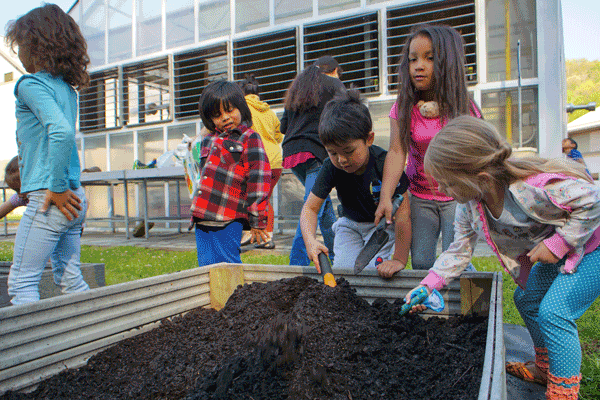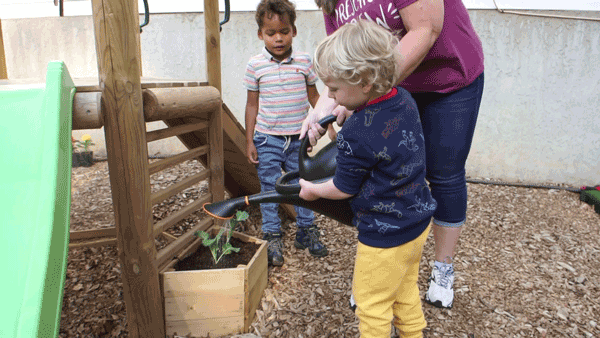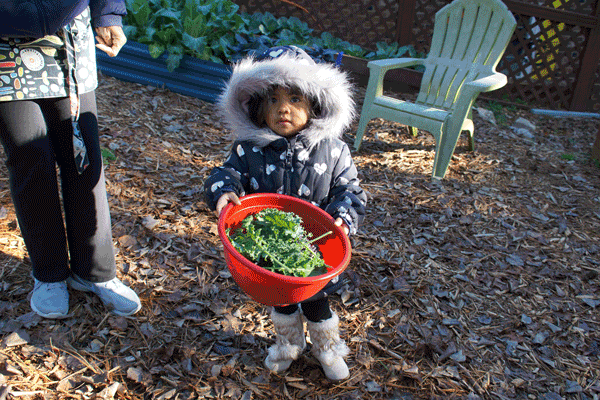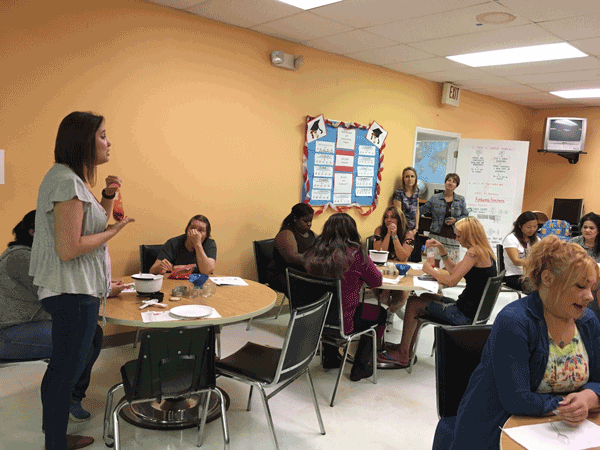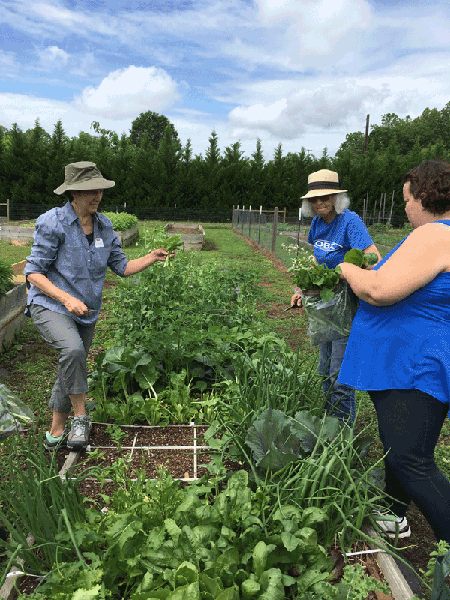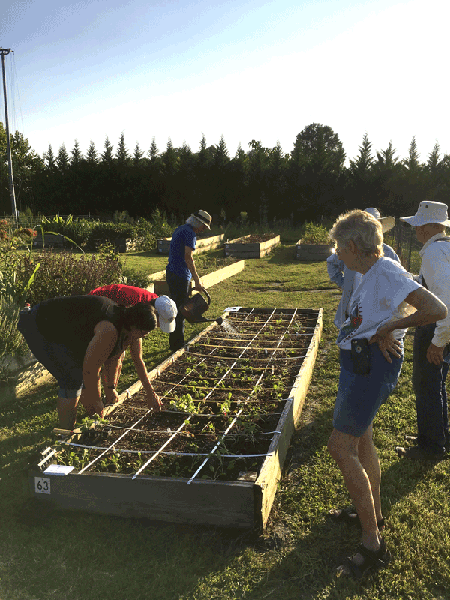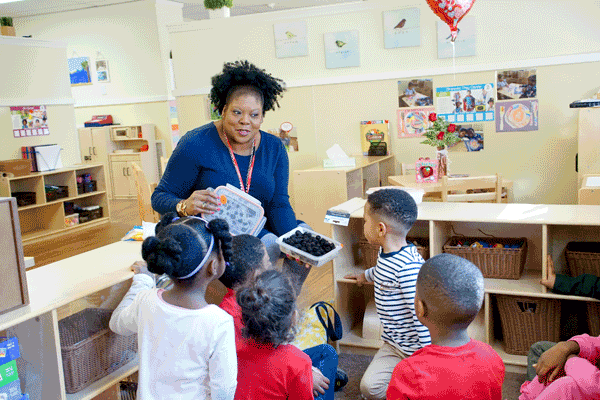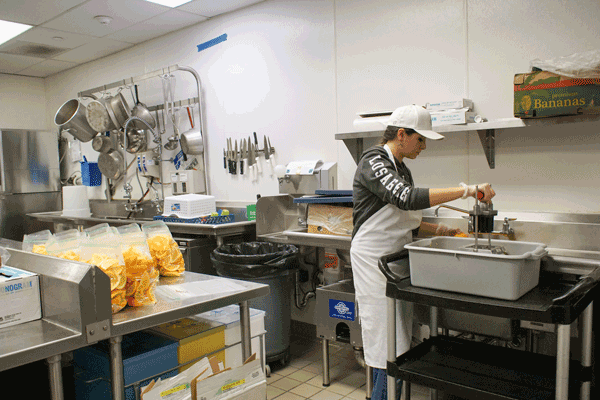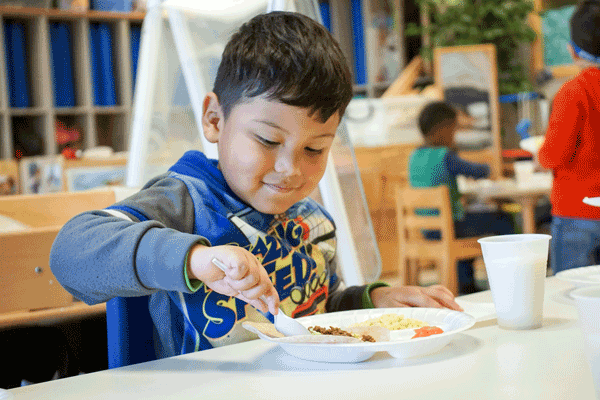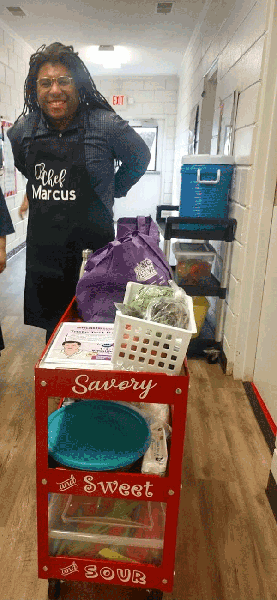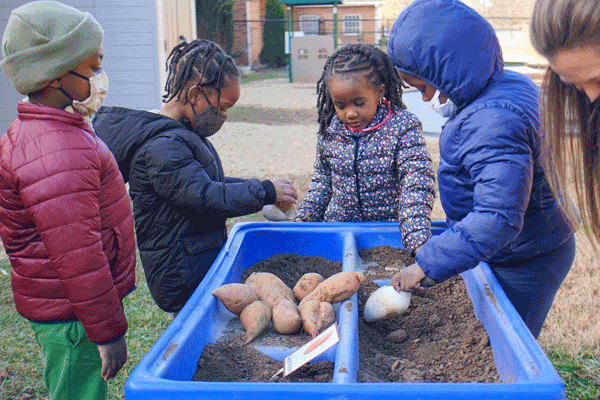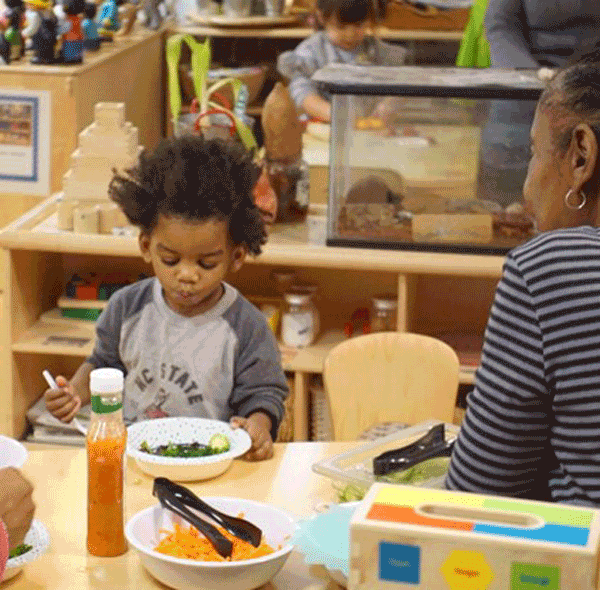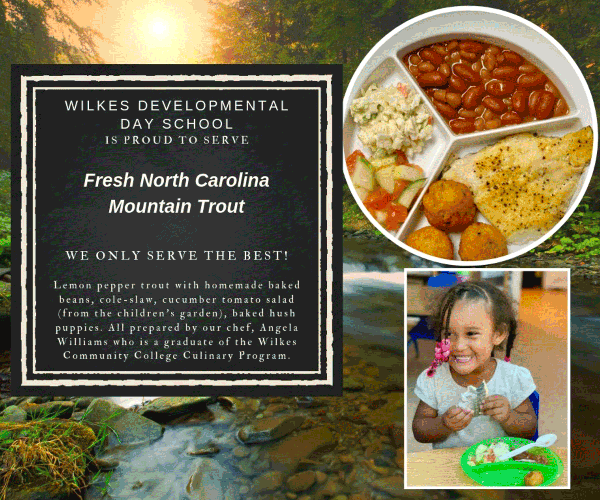Component 1: Gardening
Benefits of Gardening with Young Children
Gardens in ECE programs can introduce new foods to children, and can improve healthy habits for a lifetime. The Natural Learning Initiative (NLI) of North Carolina State’s College of Design has expert resources on gardening with young children. The NLI has identified the following benefits of gardening with young children:
- Provides opportunities for building science skills, such as observation, inquiry, and experimentation
- Increases motivation to taste, eat, and enjoy the produce they grow
- Builds respect for nature and our environment
- Provides opportunities for increased family engagement in school environments
Cooperative Extension + Gardening with Young Children
How can you plug in?
- Provide an introduction to gardening basics
Early childhood educators may be interested in gardening but could be new to the field. They will need guidance on where to start, and they may need to know how to build raised beds, start a garden from scratch, how and why to start small, and knowing what to plant as well as where to plant it, at what time of the year, and when it will be ready for harvest. Their needs are similar to a backyard gardener, although they need to be aware of the special considerations for small bodies with small hands in the garden.
- Provide gardening information for center staff and families
Information-sharing, publications, plant material, tools, and soil amendments are just a few of the resources that can be provided to child care center staff. Connections to other resources can also be shared.
- Provide consult on garden technical issues
Existing gardeners may need guidance from an agent or an Extension Master GardenerSM volunteer (EMGV) to solve common garden problems, such as pests or irrigation issues.
- Teach backyard gardening workshops
Families may be interested in a series of workshops, as garden fever spreads into the homes of the children and families served by the centers.
- Recruit, train, and manage volunteers
Volunteers are an important factor in the success of the gardens. Recruit, train, and manage volunteers through the EMGV program, the 4-H program, or even parents. Some volunteers may love working with children and leading activities, while others may want to work in the garden behind the scenes, or to work primarily with the program administrators. It is helpful to determine the preferences and strengths of your volunteers for the most success, and to provide opportunities that match their interests and skills.
- Promote diverse, inclusive, and equitable programming
Engage parents and the community of young children in deciding what to grow in the center’s garden. Encourage children to bring in recipes and to grow fruits and vegetables featured in popular dishes from their home or community.
- Connect with farmers, local community gardens, and nurseries
These stakeholders can provide educational opportunities and can contribute seedlings or other gardening supplies to the centers.
Special Considerations for Early Childhood Programs
Gardening is a multifaceted learning experience for children and may not always yield a bumper crop. Recognizing the value of the different benefits will allow participants to garden for the experience, and not just for production. To tailor the gardening experience to young children:
- Consider using smaller beds, such as 3 ft × 8 ft, so that smaller children can reach to the middle of the beds and access the garden from both sides
- Provide smaller gardening tools, which are appropriately sized for children’s smaller hands
- Grow herbs and textured plants, which create a sensory garden and an ideal learning environment for infants and toddlers
- Avoid plants that are toxic to children—see resources at NC Poison Control
- Use this Environmental Health Q&A document to learn directly from Children’s Environmental Health about what is allowable and unallowable in a child care garden
North Carolina State Extension Master GardenerSM Program
The N.C. State Extension Master GardenerSM (EMG) Program recruits, trains, and engages individuals to serve as volunteer educators who strengthen Extension’s delivery of horticultural knowledge to North Carolinians. Under the guidance and direction of Extension agents, these individuals complete a 40-hour training program in sustainable gardening, pass an examination, and complete a 40-hour internship to become certified Master Gardener℠ volunteers (MGVs). The volunteers complete a minimum of 20 hours of volunteer service and 10 hours of continuing education each year. Volunteer activities support the EMG mission of “connecting people with horticulture through science-based education and outreach that empowers individuals to cultivate healthy plants, landscapes, ecosystems, and communities.” Depending on the educational goals and volunteer capacity of each local EMG program, which operate under the leadership of the local Extension horticulture agent, MGVs may be able to offer the following educational support:
- Teach introductory gardening skills to early childhood educators
- Support garden creation and care by providing recommendations on site selection, soil preparation, and planting schedules
- Consult on technical issues in gardening, such as pest or disease identification, integrated pest management, and horticultural best practices
- Teach gardening workshops for families
- Lead gardening activities for children
- Serve as a garden coach for the center
Additional Resources
- Natural Learning Initiative Gardening Activity Guide
- Natural Learning Initiative Resources
- Natural Learning Initiative: Best Practices Toolkit
- Childcare Production Gardens Extension Publication series
- Appalachian Sustainable Agriculture Project—Growing Minds Farm to Preschool Toolkit
- CEFS Farm to ECE Initiative—Learning Bursts
- Children’s Environmental Health Q&A Document—What is allowed in a child care garden?
- Gardening in Preschools
- Food Safety in the Garden
- Collard Greens and Common Ground: a North Carolina Community Food Gardening Handbook
- KidsGardening.org
Agent Spotlight: North Carolina Cooperative Extension in Caldwell County
Early Head Start Parent Gardening Experiences—Lenoir, North Carolina
When Amber Neill-Swaney brought Shebala Norwood to a class on growing garlic at the North Carolina Cooperative Extension Center in fall of 2017, she did not anticipate that she was laying the foundation for an entire gardening program. Amber and Shebala coordinate parental education at the Family Resource Center and Early Head Start in Lenoir, North Carolina. After the garlic class, they engaged Eli Snyder, then the Horticulture Extension agent in Caldwell County, to see if they could offer gardening classes for the parents at their center.
The group decided it was best to focus the garden classes on growing food in small or temporary spaces, because many families have small yards or patios, and many rent their homes or apartments. Eli began with a class on container gardening. Banner Greenhouses, a local family-owned nursery, donated vegetable transplants, soil, and containers for each family. They met monthly throughout the season to discuss how their plants were doing and to learn new gardening concepts, such as basics of soil management, planting and trellising crops, pest management, harvesting, and post-harvest handling. They often met at Unity Park and Community Gardens, a public community garden in Lenoir where they worked alongside Extension Master Gardener volunteers to help maintain their demonstration plantings. This opportunity gave them hands-on experience to take home and apply in their own gardens.
The eight families that participated throughout the season were able to learn how to grow food in three seasons, in containers, and in soil or raised beds. The families also learned about the resources that North Carolina Cooperative Extension and Extension Master Gardener volunteers could offer, and about community gardening as an opportunity to grow food even when they did not have a typical place to garden at home.
Do Volunteers or Agents Need a Background Check to visit a Child Care Center ?
This question depends on the center’s leadership. If you volunteer and there are other adults (such as teachers) who have direct responsibility for the children, you will not be required to obtain a background check. However, if you are working with the children one-on-one in the center, you probably would need a background check. It is best to check with the director at each center for clarification.
Component 2: Cooking
Benefits of Cooking Local Food for and with Young Children
Early Care and Education environments provide rich opportunities to work with cooking staff, teachers, and children in preparing and promoting fresh, local foods. At the same time, cooking with children offers unique opportunities for building social and emotional skills, as well as cognitive, physical, and language skills. Cooking with children also provides enriching Science, Technology, Engineering, Art, and Math (STEAM) opportunities that are conducive to the children’s success when they enter school.
Cooking with young children promotes healthy eating habits that become the foundation for lifelong healthy nutrition. When teachers introduce healthy foods to young children in a relaxed and fun environment, children absorb the information and utilize this knowledge as they continue to grow and make their own food choices. When working in ECE classrooms or home child care sites, it is important to remember that young children look to adults as role models and will absorb information “like a sponge.”
Cooperative Extension + Cooking for and with Young Children
How can you plug in?
- Work with ECE Teachers. Extension agents can provide teachers with workshops on cooking with children, and they can connect teachers with the knowledge and resources to conduct cooking activities in their classroom. Some ideas for teachers to encourage healthy eating and teaching children about nutrition include:
- Eat healthy foods in front of the children. Seeing an adult try healthy foods can encourage a child to follow along. Have open, honest conversations with children about the nutritional content of food and how nutrition affects their health.
- Introduce new foods through taste tests.
- Incorporate new foods within the menus at school.
- Make introducing new healthy foods a hands-on activity that is fun for all.
Resources for teachers include children’s books, lessons that involve tasting fresh food, and cooking toolkits.
- Color Me Healthy (with opportunities for embedding local foods taste tests into nutrition education)
- Cooking Local Foods with Children (Best practices, equipment recommendations, recipes, and more)
- Harvest for Healthy Kids Activity Kits
- Classroom Cooking Cart
- Taste Test Box—Small Bites Adventure Club
- Sign up here for the Annual NC Crunch!
SNAP-Ed
SNAP-Education (SNAP-Ed) is a federally-funded, evidence-based program that helps people lead healthy, active lives. SNAP-Ed’s goal is to improve the likelihood that persons eligible for the Supplemental Nutrition Assistance Program (SNAP) will make healthy food and lifestyle choices that prevent obesity. SNAP-Ed teaches families how to make their SNAP dollars stretch, how to shop for and cook healthy meals, and how to stay physically active. North Carolina State’s SNAP-Ed program, Steps to Health, offers the Color Me Healthy curriculum to eligible child care programs, a program developed for children four and five with fun, interactive learning opportunities on healthy eating and physical activity. Steps to Health also incorporates Farm to ECE and gardening as part of its emphasis on policy, systems, and environmental (PSE) changes. Steps to Health has helpful information on how to grow food, including the Grow Food From Seeds! brochure.
- Work with Cooking Staff Agents can provide technical assistance to cooking staff who are new to preparing fresh food. Switching from canned food to fresh, local food can be a challenge, and may require new skills and equipment to prepare. Consider including the center’s cooking staff in any Farm to ECE workshops delivered to educators. These resources can help train kitchen staff:
- Fresh Produce Calculator—calculate the amount of produce needed, based on meal type and the number of children served
- Child and Adult Care Food Program (CACFP) Local Food Sample Menus—sample menus that adhere to the CACFP federal nutrition requirements
- Work with Families Extension agents can provide workshops and resources for parents and caregivers that include children in the cooking. These resources promote cooking activities at home:
- Making Your Own Local Baby Food
- Cooking With Preschool Children
- Cooking with Kids—(Recipes, how-to videos, and kids activities)
- Farm to Home Explorer Kit—Small Bites Adventure Club
- ChopChop Family
- Agents can also provide nutrition and cooking programs with families at child care centers, such as NC Expanded Food and Nutrition Education Program (EFNEP) and Med Instead of Meds.
The Child and Adult Food Program (CACFP)
The Child and Adult Care Food Program (CACFP) is a federal program that provides reimbursements for nutritious meals and snacks to eligible children and adults who are enrolled at participating child care centers, day care homes, and adult day care centers. Enrolled centers must meet federal nutritional guidelines for all meals and snacks, and submit receipts for reimbursement.
NC State Extension Master Food Volunteer (EMFV) Program
The NC State Extension Master Food Volunteer (EMFV) Program offers volunteers formal training so that they can support Family and Consumer Science (FCS) agents in their community-based food and nutrition-related programs. EMFVs receive 30 hours of training about nutrition, food safety, food systems, racial equity, cooking skills, and cooking demonstrations. They also shadow an FCS Agent for 30 hours and receive 10 hours of continuing education a year. EMFVs can support any FCS-related activities in Farm to ECE programs. Working closely with their supervising FCS Agent, EMFVs offer the following activities:
- Conduct cooking demonstrations and/or taste tests
- Offer classroom-based support to teachers
- Assist or teach Color Me Healthy (*requires additional training through SNAP-Ed Steps to Health to be able to teach independently)
- Offer knife skills training related to fresh produce preparation to cooking staff
- Support social media and newsletter writing
Special considerations for Early Childhood Programs
Sanitation in the Classroom
The North Carolina Sanitation Regulations for Child Care Centers regulates food activity in the early childhood classroom. Children’s Environmental Health Q&A document identifies these regulations for teachers and technical assistance providers.
Even if your county CEH consultant states that you cannot cook in the classroom, it is still possible to do smaller, simpler taste tests, as long as children only touch the food that they are eating, such as a local cucumber slice or raw carrots with a ranch dip the student makes on their own plate.
- Questions you may want to ask the Program Director or cooking staff:
- What can we cook with children in a classroom? What can we not cook?
- What food allergies do we need to be aware of?
- How can we store items for the cooking activity?
- How do we clean cooking surfaces, and what can we use for cleaning?
Go NAPSACC
Agents can help child care programs build a holistic culture of health through Go NAPSACC, a free online program of UNC Chapel Hill. Go NAPSACC’s five-step improvement process helps child care programs assess their current practices and reach best practice goals in Farm to ECE, and other focus areas of child health. To learn more about Go NAPSACC or become trained as a Go NAPSACC consultant, email gonapsacc@unc.edu. Agents should contact their Regional Nutrition Extension Associate (RNEA) to determine SNAP-Ed eligible sites and Policy Systems and Environmental Change (PSE) opportunities with Go NAPSACC.
Additional Resources
-
CEFS Farm to ECE Initiative—Learning Bursts
Agent Spotlight: Cross-Program Collaboration for Farm to ECE with North Carolina Cooperative Extension in Union County
Farm to ECE connects our younger children in Union County to farming, food, and the environment around them. Extension agents Marcus McFarland (FCS) and Aaron Moore (Small Farms), Director Cindy Owen from New Testament Child Development Center, Program Quality Specialist Resha Washington from Alliance for Children, and Executive Director Linda Smith from the Alliance for Children have collaborated over the past three years to connect New Testament’s curriculum and the children’s learning environment with learning how to grow, purchase, and cook local food.
One of the best moments for the children was making new dishes with fresh foods in their classroom! Several of the classrooms (age 3 to 5) were able to join Family and Consumer Sciences Extension agent Marcus McFarland (or "Chef Marcus," as the kids called him) to make a tasty salad with summer peaches. The children helped to make the salad by learning how to cut peaches with safety knives, rip up salad greens, and shake the vinaigrette dressing. The kids had so much fun and shared their cooking experiences with their parents at home. The best thing about our cooking day? Kids really loved the salad! In addition, teachers at the school now have a cooking cart that they can use for future cooking classes with their students.
Component 3: Local Food Purchasing
Benefits of Early Childhood Programs Purchasing Local Food
Early Care and Education Programs in your community are potential customers for local farmers, because most programs serve two meals and one snack every day. Purchasing local food directly from a farm helps to support farmers. It can also help farmers build their consumer base, because ECE centers inform parents and staff about the source of foods so that they can locate that farmer at other markets. Local food can also come through a distributor that still supports local farmers. Buying local food ideally improves the health of rural economies, helps farmers remain in business (which preserves farmland), and provides highly nutritious food for consumers. For a full guide to helping child care programs purchase locally, see the North Carolina Farm to Early Care and Education (ECE) Local Food Buying Guides.
Cooperative Extension + Local Food Purchasing
How can you plug in?
Extension agents can serve a pivotal role as a connector for ECE programs and farmers, because they know the local farmers in the area that can serve the centers’ needs. Since the ECE providers may not have built relationships with farmers or know how to meet them, they often rely on agents to make these connections.
Agents can also help centers promote local foods to the children and families they serve. This assistance might include providing recipes, taste testing new foods, and cooking in the classroom to familiarize children with new menu items.
In Farm to ECE, it’s important to think of the entire child care community as the audience, not just the center that is directly purchasing local food. Agents can assist with providing farmer profiles for child care newsletters, linking the centers and families to CSA boxes from local farmers, or arranging events that connect farmers and the child care community (for example, setting up a farm stand at a child care center). Teneshia Tyson, Director at Follow the Son Child Care Center, was able to do just that (Farm to Early Care and Education success stories). Also, consider connecting farmers, local community gardens, and nurseries with the ECE program to create educational opportunities, such as field trips and special guest visits to the classroom.
Agents can also assist ECE directors in promoting diverse, inclusive, and equitable meal environments by serving foods from local farmers that reflect the food traditions of the children and families they serve. This helps all children and families develop a feeling of belonging in the school.
Special Considerations for Purchasing Local with Early Childhood Programs
The how, what, and why of local purchasing will be different in every center. It depends on what is available in your region, as well as the centers’ priorities, preferences, and capacity for purchasing and preparing local food items. Some centers may start small and focus on including food from their garden into snack time, while others may connect with distributors or food hubs, so that they can have multiple local food items at every meal (find out more about food hubs operating in North Carolina). Others may even be interested in connecting directly with a farmer, and making local food purchasing available for families and staff.
Many child care centers may be interested in purchasing low volumes of food, since their capacity to process fresh foods may be limited and serving sizes for young children are small. This can also make delivery challenging, although some child care directors may be willing to go to the farmers’ market to pick up orders. Despite the fact that centers may purchase small volumes, they provide an opportunity for farmers to connect to their communities and to increase their profile by advertising to families through newsletters, menus, and cross-promoting on the centers’ social media pages.
We have developed a ”Decision Tree” as part of our local food purchasing guide for Farm to ECE to help child care and technical assistance providers consider all options and decide what local food purchasing works for them. The guide provides centers with a step-by-step process to: (1) assess their food capacity; (2) determine the best local food source and find vendors; (3) clarify their definition of local food, and understand how local purchasing fits into CACFP, and (4) take steps to purchase local food. The guide includes a decision tree to support centers as they move through these steps, as well as a description of different types of local food vendors and best practices for building successful local food relationships. In addition to the decision tree, we provide a menu analysis worksheet, a template for communicating with distributors and farmers about local food questions and concerns, and a list of additional resources.
Cooperative Extension Agent Spotlight
Carol Mitchell, the former N.C. Cooperative Extension Local Foods agent in Wake County, was one of the creators of the Wake County Farm to Child Care project. As a Wake County Smart Start board member, Carol had the idea of connecting child care programs to local foods and she helped write grants to support the development of this project. Carol talked with farmers about how they could benefit from having child care programs as one of their customers. Lynn Policastro, through her role as Technical Assistance Provider at Wake County Smart Start, had connections to child care facilities in the area, and identified which centers would be interested and ready for local produce from the farmers.
After child care facilities began purchasing fresh and local produce, the interns and staff of N.C. Cooperative Extension in Wake County provided knife skills classes to their cooking staff. The Cooperative Extension Cooking Lab hosted a class on knife skills in which participants had hands-on practice. Items that were chopped during the class were used to prepare several dishes that the group could taste test.
Cooperative Extension summer interns in Wake County then created a database of recipes that use fresh local produce items for ECE center directors and cooking staff. Interns used these recipes to provide taste tests in ECE classrooms throughout the county.
Additional Resources
- North Carolina Farm to ECE Local Food Buying Guides
- Learning Bursts
- Local Food Purchasing 101
- Children’s Environmental Health Q&A Document
- Fresh Produce Calculator—calculate the amount of produce needed, based on meal type and the number of children served
- CACFP Local Food Sample Menus
“Promoting Local Foods in the ECE Community”
FCS Agent Spotlight
By Ivelisse Colon, FCS agent, Orange County
Agents can assist centers not only in helping them source local food for meals and snacks but also in promoting new farmers and foods to families and children. Ivelisse Colon, Orange County’s Family Consumer Science agent, joined Orange County Partnership for Young Children in providing technical assistance for the Community School for People Under Six (CS4PU6) in Carrboro, as part of North Carolina Farm to ECE Collaborative, a CEFS Initiative. Through this collaboration, the center developed a garden from which they harvested fruits and vegetables for the children’s daily snacks. The center director also connected with a local food hub, Farmer Foodshare, to supply local foods for their snacks. As part of the Farm to ECE Collaborative, their team members helped the center establish new goals to expose children and their parents and families to new, local foods.
Through a survey on local foods delivered to the school’s parents, the idea of the Farmers Market Scavenger Hunt emerged. The Carrboro Farmers Market is within walking distance, which is about a mile from CS4PU6. In addition to Saturdays, the market is open on Wednesday afternoons from spring to the end of the fall. During this now annual field trip, the teachers walk with the preschool children to the market and help them complete a “farmer’s market scavenger hunt.” The children’s “scavenger hunt” activity page is filled with pictures of different vegetables sold at the market. The children try to find the items, talk to the farmer, and write the name of the farm under each image. At the end of the hunt, the children receive tokens to spend at the market, which are sponsored by the farmers’ market. This activity opens the children’s minds about trying new foods, while also promoting the consumption of local produce at home. After the scavenger hunt, parents pick up their children from the farmers’ market, which provides an opportunity for families to learn more and purchase from the market. Visit the CEFS Resources page to download a copy of the Farmers Market Scavenger Hunt.
Using a distributor to source local
Local on the Menu: Wilkes Developmental Day School
Wilkes Developmental Day School in Wilkesboro, North Carolina faced a logistical challenge in procuring local ingredients from individual farms. To address this barrier, the school worked with their current food supplier, US Foods, to identify local items available for purchase. Through US Foods, the school was able to order locally-produced foods, such as trout from the North Carolina mountains, without having to change their system of billing or delivery. The school chef is a graduate of the local community college culinary program and was able to replace fish sticks with the local trout featured in the photo below.
Publication date: Jan. 19, 2023
LF-20
Other Publications in Farm to Early Care and Education Resource Guide for North Carolina Extension Agents
- Farm to Early Care and Education
- Connecting to Early Childhood Partners in Your Community
- Three Components of Farm to ECE: Gardening, Cooking, and Local Food Purchasing
- Diverse, Inclusive, and Equitable Family Engagement Opportunities with Farm to ECE
N.C. Cooperative Extension prohibits discrimination and harassment regardless of age, color, disability, family and marital status, gender identity, national origin, political beliefs, race, religion, sex (including pregnancy), sexual orientation and veteran status.

